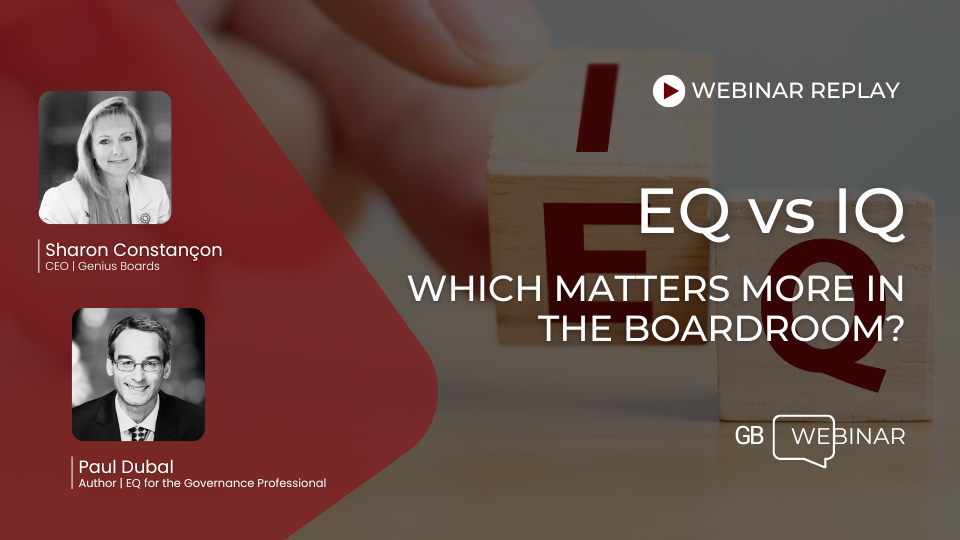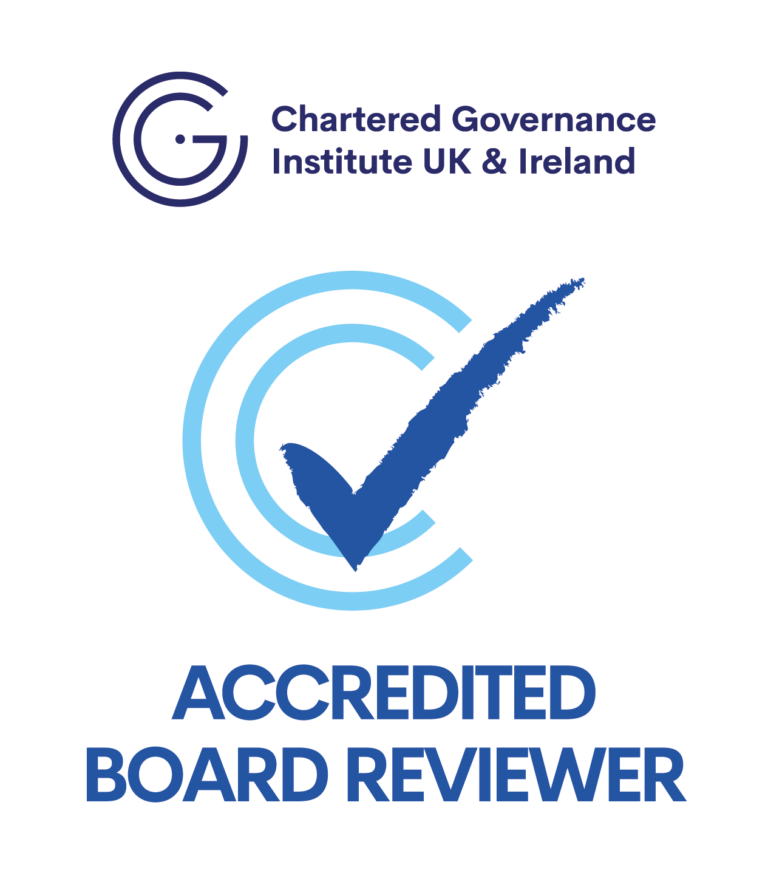Boards today operate in a complex environment where success depends on more than technical knowledge. EQ vs IQ in the Boardroom explores how emotional intelligence balances analytical skill to create stronger governance, trust, and decision-making.
Hosted by Sharon Constançon (CEO, Genius Boards) and Paul Dubal (Author, EQ for the Governance Professional), this governance webinar replay reveals why emotional intelligence in governance is no longer optional. You’ll gain fresh perspectives on the boardroom EQ balance, leadership behaviours, and the vital roles of the Chair and Company Secretary in shaping culture.
Watch the full replay below and discover practical insights that can transform your board’s effectiveness.
Key Takeaways from EQ vs IQ in the Boardroom:
The discussion revealed how emotional intelligence and technical intelligence intersect to shape board performance. These key takeaways highlight the practical lessons boards can apply to strengthen decision-making, trust, and collaboration.
1 | Boards Need Balance, Not a Battle
Effective governance requires both IQ and EQ. IQ drives analysis and strategy; EQ enables empathy, listening, and collaboration — turning intelligence into collective wisdom.
2 | Emotional Intelligence Strengthens Governance Culture
Boards with strong EQ create psychological safety, invite diverse perspectives, and encourage constructive challenge — essential for sound boardroom decision-making.
3 | Leadership Roles Depend on EQ
The Chairman’s EQ determines tone and trust. The Company Secretary’s EQ influences relationships and communication. Together they shape how the board functions as a cohesive team.
4 | Groupthink Undermines Board Effectiveness
Without emotional awareness, boards fall into consensus traps. EQ empowers directors to question respectfully, avoid blind spots, and enhance oversight.
5 | EQ Can Be Developed
Unlike IQ, emotional intelligence can be learned. Ongoing reflection, feedback, and behavioural training help boards build resilience and adaptability.
Featured Article
Even well-structured boards can fall victim to groupthink—when silence replaces challenge and consensus masks discomfort.
Explore how subtle behavioural dynamics undermine decision-making and what boards should do to recognise risk, enable inclusion, and stay effective at the top.
Ready to build EQ in your boardroom?
Explore Genius Boards’ Boardroom Dynamics Training — practical sessions that strengthen emotional intelligence, trust, and collaboration at board level.
Host
Sharon Constançon is CEO of Genius Boards, where she leads on board performance reviews, board dynamics training, and governance advisory. With over 25 years of direct board-level experience across different industries, Sharon is recognised for her deep expertise in board behaviours, leadership, and risk awareness.
A seasoned board evaluator, Sharon combines analytical insight with emotional intelligence to uncover the behavioural patterns that drive, or derail, board effectiveness. She has delivered governance solutions to FTSE boards, financial services entities, and complex organisations across many sectors.
Sharon is also a respected educator. She lectures on Boardroom Dynamics at Qualifying Level for the Chartered Governance Institute UK & Ireland, and delivers risk training as faculty for the Corporate Governance Institute. She mentors Chairs and Directors and is a champion of the Company Secretary as a key enabler of good governance.
Her strength lies in translating behavioural insight into practical strategies that elevate board performance and decision-making.
Guest Speaker

Paul Dubal
Author & ISO37000 Certified Governance Expert
University of Exeter Business School
Paul Dubal is a fellow of the Chartered Governance Institute (FCG), a certified EQ practitioner, and founder of Perfect Balance Consulting, which provides governance and leadership solutions. With over 25 years of experience in the UK, Caribbean, Canada, and the Middle East, Paul is recognised as a thought leader, mentor, and coach on corporate governance, leadership, and emotionally intelligent culture.
His book, EQ for the Governance Professional, offers practical guidance on applying emotional intelligence to governance roles, helping professionals develop the “soft skills” to influence stakeholders, resolve conflict, and build credibility. Paul is also ISO 37000 Certified in governance, an NLP-qualified coach, and an EQ-i Certified Emotional Intelligence Assessor and Trainer.













